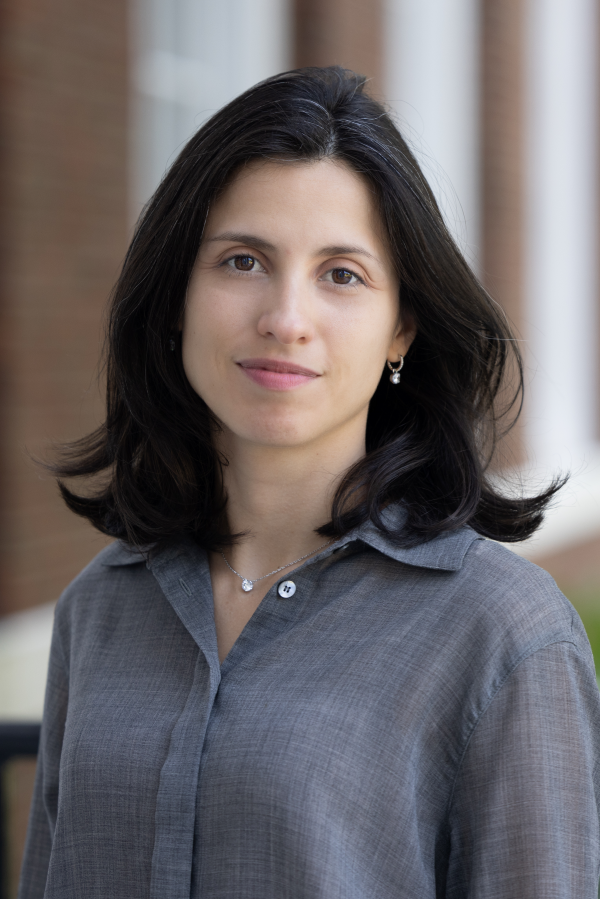Center for Public Policy Events
The Hobby School of Public Affairs invites you to attend the Center for Public Policy speaker events.
Upcoming Speakers
Hobby School of Public Affairs
Center for Public Policy Speaker Series
 Tanushree Goyal, Assistant Professor of Politics and International Affairs, Department of Politics
and the School of Public and International Affairs, Princeton University
Tanushree Goyal, Assistant Professor of Politics and International Affairs, Department of Politics
and the School of Public and International Affairs, Princeton University
Date: October 9, 2025
Time: 12:00 pm
Location: Heritage Room (201), Bates Hall
Paper title: Representation from Below: The Grassroots Origins of Women’s Political Power
Abstract: After decades on the political sidelines, women are now at the heart of India’s development agenda. Political parties are placing them front and center—shaping platforms, driving mobilization, and crafting electoral appeals around their participation. Representation from Below traces how this transformation began far from the halls of power, taking root in local politics and rising through party organization. It develops a new theory of inclusive party-building to explain how women in local politics transform party organizations to secure responsiveness and advance representation at the highest levels of politics. Drawing on fieldwork, original data, and experimental research, the book shows how women in local politics, responding to career incentives, began building grassroots chapters of women’s wings and recruiting other women into activism—quietly reshaping party structures from the ground up. As women became indispensable to electoral mobilization, party leaders responded strategically: adapting platforms, expanding welfare schemes, and opening paths to higher office. The book challenges the view that political parties stand in the way of women’s empowerment, or that women in deeply patriarchal systems lack agency. Instead, it highlights how the very constraints and spaces once defined by women’s marginalization—households, gender norms, and women-centered networks—become unlikely engines of democratic change. When parties are build inclusively from below through women’s participation, the ripple effects extend far beyond the local level—transforming national politics and offering lessons that resonate historically and well beyond India’s borders.
About the speaker: Tanushree Goyal is an Assistant Professor of Political Science and International
Affairs at the Department of Politics and the School of Public and International Affairs,
Princeton University. Her research sits at the intersection of comparative politics,
gender and politics, and the political economy of development, with a focus on India
and Brazil. Her work employs a diverse range of methodological approaches, including
natural, survey, and field experiments, large-scale and long-form surveys, in-depth
qualitative fieldwork, and high-resolution administrative data.
Her research has been published in leading political science journals, including the
American Political Science Review, the American Journal of Political Science, and
the Journal of Politics. It has also been widely covered in national and international
media, and she has contributed opinion editorials to The Indian Express.
Her scholarship has been recognized with several of the most prestigious awards in
political science, including the Mancur Olson Best Dissertation Award in Political
Economy (2022) and the Juan Linz Prize for Best Dissertation in the Comparative Study
of Democracy & Autocracy (2023). Recently, she received the prestigious APSA Urban
and Local Politics career award, the Susan Clarke Young Scholar Award (2025).
She serves as an Associate Editor at World Politics and is a member of EGAP, J-PAL,
and the UK’s Political Economy Group. Before joining Princeton, she was a postdoctoral
scholar at the Harvard Academy and a non-resident visiting fellow at the Center for
the Advanced Study of India at the University of Pennsylvania. She earned her Ph.D.
in Political Science from the University of Oxford in 2021 as a member of Nuffield
College. Before transitioning to political science, she completed a bachelor’s degree
in Computer Science and Engineering.
Highlights Spring 2025
 Blake Heller, Assistant Professor at the Hobby School of Public Affairs, University of Houston
Blake Heller, Assistant Professor at the Hobby School of Public Affairs, University of Houston
Date: April 22, 2025
Time: 1:00pm
Location: Heritage Room (201), Bates Hall
Paper title: Property Taxes and Public School Investment
Abstract: This project examines how the salience of taxation influences support for increased investment in public schools. We study this in the case of a policy change in Texas. Specifically, the Texas legislature passed a bill in 2019 (HB3) requiring the ballot text of local school bonds to end with “This is a property tax increase.” Some argue this policy represents a sophisticated approach to increasing democratic transparency, while others contend that requiring a property tax acknowledgement is misleading, especially when bond repayment is not projected to affect property tax rates. We leverage the fact that the policy did not affect other municipal bond elections to identify its impact on school bond passage rates and bond-related investment in Texas public schools. Preliminary analyses suggest that linking school bonds with property taxes significantly alters voter behavior. We estimate that introducing this language reduced Texas school bond passage rates by roughly 20 percentage points between 2020 and 2024. We plan to conduct a survey experiment in March 2025 to validate the quasi-experimental evidence and explore the mechanisms that drive the effects.
About the speaker: Blake is an Assistant Professor at the University of Houston's Hobby School of Public Affairs. He studies education policy through the lens of applied microeconomics, with a focus on alternative academic pathways, adult education, and immigrant language skills. His research uses quantitative tools to model the essential character of pressing social challenges and assess potential solutions.
Highlights from Spring 2025
Date: April 17, 2025
Time: 2:00pm
Location: Albertus room, Bates
Paper title: Candidate Origins of the Recent Stagnation in Midlife Mortality in the United States
2025 Francisco Cantú Memorial Empirical Implications of Theoretical Models (EITM) Conference Is hosted by the Hobby School of Public Affairs, with support from the Department of Political Science, at the University of Houston. This conference aims to bring together scholars who advance the field of EITM, broadly defined. The conference also honors the legacy of Francisco Cantú. For more details go here.
Date: March 28 and 29, 2025
 Shaoda Wang, Assistant Professor at the University of Chicago Harris School of Public Policy
Shaoda Wang, Assistant Professor at the University of Chicago Harris School of Public Policy
Date: March 25, 2025
Time: 4:00pm
Location: Teaching Unit 211
Paper title: The Law and Economics of Lawyers: Evidence from the
Revolving Door in China’s Judicial System
Abstract: This paper studies the roles of lawyers in shaping judicial and economic outcomes, exploiting the unique setting of “revolving-door” lawyers in China’s judicial system. By compiling a comprehensive dataset covering the universes of judges, lawyers, law firms, litigants, and lawsuits in China from 2014 to 2021, we identify over 14,000 judges who left their positions to practice as lawyers, accounting for 6.6% (2.6%) of all judges (lawyers) nationwide. We report three main findings. First, in otherwise identical lawsuits, these revolving-door lawyers obtain significantly more favorable court decisions for their clients. Second, leveraging within lawyer variation in performance at home vs. away courts, we show that the advantage of revolving-door lawyers comes from both “know who” and “know how.” Third, revolving-door lawyers create countervailing forces in society — on the one hand, they present evidence and reasoning to help judges make more informed decisions; on the other hand, they use connections and strategic arguments to help their (affluent) clients, thereby biasing judicial decisions and exacerbating socio-economic inequalities. We extend the theoretical framework of Dewatripont and Tirole (1999) to quantify these trade-offs.
About the speaker: Shaoda Wang is an Assistant Professor at the University of Chicago Harris School of Public Policy, a Faculty Research Fellow at the National Bureau of Economic Research (NBER), and an affiliate of the Bureau for Research and Economic Analysis of Development (BREAD). He also serves as the Deputy Faculty Director of the China centers of the Becker Friedman Institute (BFI‑China) and the Energy Policy Institute at UChicago (EPIC‑China). He is an applied economist with research interests in development economics, environmental economics, and political economy, with a regional focus on China. He holds a BA from Peking University and a PhD from the University of California, Berkeley. Prior to joining Harris, he was a Postdoctoral Scholar in the Department of Economics and the Energy Policy Institute (EPIC) at the University of Chicago.
 Haaris Mateen, Ph.D., Assistant Professor of Finance, C.T. Bauer College of Business at the University
of Houston
Haaris Mateen, Ph.D., Assistant Professor of Finance, C.T. Bauer College of Business at the University
of Houston
Date: March 4, 2025
Time: 1:00pm
Location: Heritage Room (201), Bates Hall
Paper title: Something Biased This Way Comes: The Effect of Media on House Elections in the US
Abstract: We study how a biased TV station operator affects local elections in the US. We document an ideological shift to more conservatism for the winner in House of Representatives elections, which strengthens over time. This is driven by a higher probability of Republicans winning but also a shift to more conservatism for both Republican and Democratic candidates, even though Democratic candidates in the primaries become more liberal on average. We show that Republican candidates receive increased donations in SBG-acquired areas.
About the speaker: Haaris Mateen is an Assistant Professor of Finance at the C.T. Bauer College of Business at the University of Houston. His research broadly focuses on finance, political economy, and urban economics. Current work topics include climate economics and finance; local governments, their financial health and sustainability; media economics. He completed his PhD in economics at Columbia University. He also holds a bachelor's in engineering from the Indian Institute of Technology Roorkee and an MBA from the Indian Institute of Management Ahmedabad.
Texas Methods Meeting - 2025 was hosted by the University of Houston Department of Political Science Hobby School of Public Affairs. This conference aims to bring together scholars (faculty and graduate students) from Texas and beyond who are doing research in political methodology, broadly defined. For more details go here.
Date: February 21 and 22, 2025
 Paula Rettl, Assistant Professor, Business, Government, and International Economy Unit at Harvard
Business School
Paula Rettl, Assistant Professor, Business, Government, and International Economy Unit at Harvard
Business School
Date: Thursday, January 23, 2025
Time: 12:00 p.m.
Location: Heritage Room (201), Bates Hall
Paper title: Turning Away from the State: Trade Shocks and Informal Insurance in Brazil
Abstract: How does economic globalization affect vote choices? Conventional wisdom holds that voters who lose from economic integration support parties that propose expanding the welfare state. However, in the Global South, where the state is frequently weak or under-resourced, people often turn to non-state organizations (such as churches) for protection against economic decline. I argue that, in these contexts, negative globalization shocks increase local communities' dependence on non-state organizations, thereby making the leaders within such organizations more effective political brokers. To test this argument, I propose a shift-share instrument that measures the exposure of Brazilian local labor markets to exogenous changes in exports. By matching this instrument with electoral and survey data, I provide evidence that declining exports increased the power of evangelical leaders to persuade their congregations to vote against parties that favor welfare-state expansion. My findings help explain and describe the contingencies underlying the political consequences of globalization.
About the speaker: Paula Rettl is an Assistant Professor in the Business, Government, and International Economy Unit at Harvard Business School. Her primary areas of expertise are comparative politics, political economy and political behavior, with a focus on Latin America and Europe. Professor Rettl’s research centers on how broad societal changes shape mass attitudes and behavior. For example, in some of her work, she examines how voters’ responses to globalization varies depending on whether they rely on the state or religious organizations for support during difficult economic times. In other work, she investigates how natural disasters shape voting behavior and the role played by economic interest in this context.
